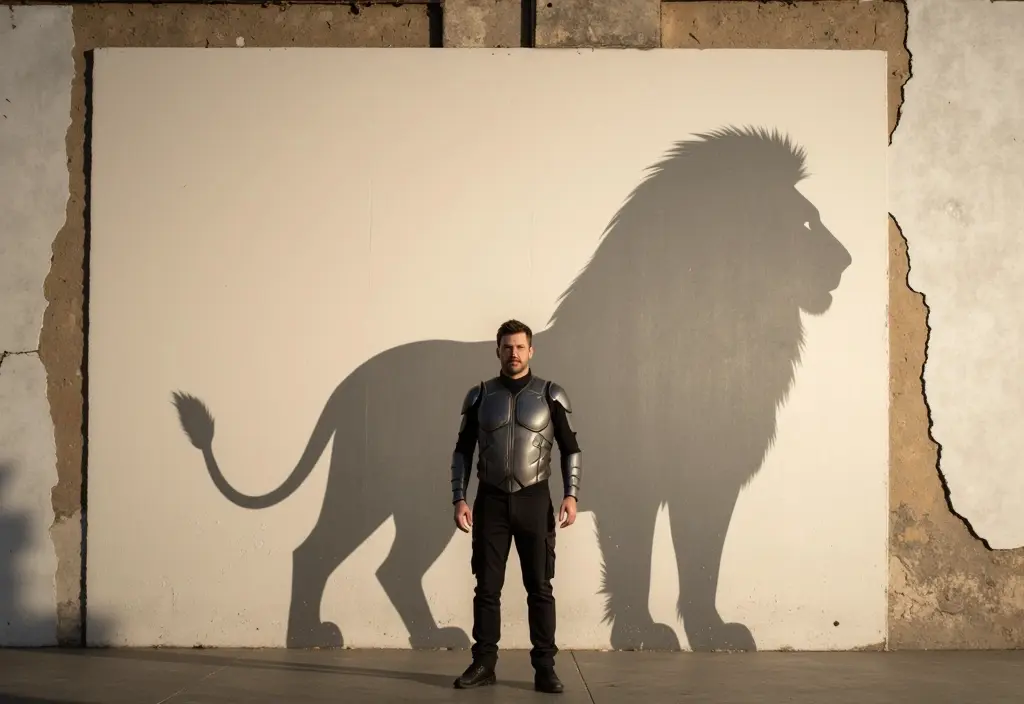Let’s just say it. The first time you hear someone use the word “daddy” in a sexy way, it’s a record-scratch moment. For me, it happened in my early twenties. A guy I was seeing, right in the middle of a passionate moment, got close and whispered, “Tell me who’s your daddy.” My brain completely blue-screened.
All I could see was an image of my actual dad, standing over a grill, wearing his signature socks-with-sandals combo. The vibe? Instantly gone. But I started hearing it more and more as the years went on. Friends talked about it, it popped up in movies, and it even found its way into my own relationships. It became obvious this wasn’t some weird, fringe thing. It’s real. So, really, why do guys like being called daddy?It’s a question that can send your mind spiraling. Is he secretly working through daddy issues? Is it purely a BDSM label? The truth is way more complicated and, honestly, a lot more interesting.
That little word has shape-shifted from a simple family title to a seriously complex signal of desire, power, and trust. When you start digging, you find this fascinating mashup of psychology, cultural trends, and the super-personal dynamics that make a relationship tick. It’s not a one-size-fits-all term, and what it means can change completely from one guy to the next. This isn’t about a single word. It’s about everything that word stands for in the moment: a rush of control, a deep sense of safety, the thrill of a taboo, or the ultimate sign of trust. Before we get into all the psychological layers, let’s hit the highlights.
More in Connection & Dating Category
How Often Does a Man Think About a Woman
What Happens When You Stop Giving Him Attention
Key Takeaways
- Forget Freud (Mostly): While the word choice seems obvious, its appeal for most guys is tied to modern relationship dynamics, not some deep-seated issue with their parents.
- It’s Often a Power Play: For many, “daddy” is a code word. It signals dominance and taking charge, which can be a huge turn-on for everyone involved.
- The Protector Instinct Is a Real Thing: The term can plug directly into that classic masculine archetype of the provider and protector. Hearing it can be a huge validation of his ability to make you feel safe.
- This Is Built on Trust: You don’t use a word this loaded without a massive amount of comfort and trust. It can be a shortcut to signifying a bond where you both feel safe enough to be vulnerable.
- The Taboo Is Part of the Thrill: Let’s be real, part of the fun is that it feels a little forbidden. Using a family word in a sexual way is naughty, and that alone can be a powerful aphrodisiac.
- Pop Culture Hit “Refresh” on the Word: Thanks to social media, “daddy” is now mainstream slang for any hot, confident, or powerful man, which has diluted its purely parental or sexual meaning.
So, Does “Daddy” in the Bedroom Just Mean… You Know?
When that word gets dropped, most minds go straight into the gutter. And look, for a lot of people, that’s exactly where it lives. But what does it really signify in that context? More often than not, it’s a verbal cue for a specific power dynamic. It has less to do with creepy family stuff and everything to do with a consensual, and often incredibly hot, exchange of power.
It gets right to the heart of dominance and submission (D/s). In this scenario, the “daddy” is the one in charge—the shot-caller, the decision-maker, the caretaker. The person saying the word is willingly stepping into a more receptive, submissive role. This isn’t about being weak. It’s about the incredible turn-on of just letting go and trusting someone completely.
Think of it like hitting “play” on a roleplay scene. For a little while, you’re both stepping into roles that crank up the intensity. The man gets to live out a fantasy of being totally in command, while his partner gets to feel the thrill of being completely cared for. It’s a powerful game, and it’s all based on consent.
What If It’s More About Power Than Parents?
The psychological kick from this power exchange is huge. For a man, being called “daddy” can feel like a shot of adrenaline straight to the ego. It’s a clear, spoken confirmation of his dominance and his desirability. It’s a partner saying, “I trust you to take the lead,” and that can be one of the most validating things to hear. It says he’s seen as strong, capable, and in control.
I actually talked about this with a partner, long after my first cringe-worthy experience. Once we got past the awkward laughter, he explained it from his side. He said it had zero to do with my dad or his. It was purely about trust. “When you call me that,” he told me, “it’s like you’re handing over all your trust in that moment. It makes me feel like I can both completely take care of you and completely unravel you.” That talk changed everything for me. It rewired the word in my brain, taking it from a weird family-reunion-vibe to a secret code for our specific kind of intimacy.
This dynamic doesn’t have to be some full-blown BDSM production, either. For a lot of couples, it’s more like “BDSM-lite”—a playful dip into power dynamics without needing a rulebook or a safe word. It’s just a simple, verbal way to set the mood.
Could He Just Want to Feel Like Your Protector?
Step outside the bedroom, and “daddy” can take on a whole different, but just as powerful, meaning. It can appeal directly to that classic, almost caveman-level instinct in men to be the protector and provider. Evolutionarily speaking, men have been wired for that role for a long, long time. That urge to be seen as the strong, reliable one—the person who brings safety and security—is baked in pretty deep for a lot of guys.
So, when a partner calls him “daddy” in a non-sexual moment—maybe after he killed a scary spider, gave some solid advice, or just gave a really good, comforting hug—it’s a high-five for his inner protector. It’s a way of saying, “You make me feel safe. You’ve got my back. You’re my rock.” For a man, that can feel incredibly good. It makes him feel seen and appreciated for the stability he provides.
This has nothing to do with making the partner seem like a child. A powerful, independent person can still love the feeling of being looked after sometimes. It’s about a partnership where you can both lean on each other. Calling him “daddy” in those moments becomes a term of endearment that’s packed with appreciation for his strength.
Is It a Throwback to Old-School Masculinity?
In a world where gender roles are constantly being blurred and rewritten, some guys find a sense of comfort in leaning into a more traditional version of masculinity. This doesn’t mean they want a 1950s housewife. Not at all. It just means they get genuine satisfaction from being the “man of the house” in some ways—the go-to problem solver, the steady presence, the protector.
Being called “daddy” fits that feeling perfectly. It’s a playful but potent word that reinforces his identity. It’s a signal that his partner doesn’t just tolerate this part of him, but actually loves it. It can make him feel masculine and valued in a very direct way. It’s a raw compliment that hits a very specific nerve of masculine pride, celebrating a version of masculinity that’s about responsibility and care.
What Does “Daddy” Say About the Trust in Your Relationship?
Here’s the bottom line: whether it’s used in a sexy moment or a sweet one, calling a man “daddy” is almost always a sign of some serious trust. You just don’t throw around a word with that many layers with someone you don’t feel completely safe with. It’s a vulnerable move. When someone says it, they’re often saying, “I trust you enough to play with power. I trust you enough to see you as my protector. I trust you with this weird, slightly taboo part of me.”
For the guy hearing it, that can feel like the ultimate compliment. It means he’s built a space in the relationship where his partner feels secure enough to be playful, to be vulnerable, and to explore. This creates an amazing feedback loop: the partner feels safe enough to say it, which makes the man feel trusted, which in turn makes him want to be even more caring and trustworthy.
This isn’t surface-level stuff. It points to a bond that can handle some real complexity.
Can It Actually Be a Sign of a Healthy Attachment?
While pop psychology loves to scream “daddy issues,” the reality can be the exact opposite. This dynamic can actually be a sign of a secure attachment style. Attachment theory, in a nutshell, says our earliest relationships with caregivers build a blueprint for our adult relationships. Someone with a secure attachment style is cool with intimacy and relying on others. They aren’t afraid to lean on their partner, and they’re happy to be leaned on in return.
Looking for a “daddy” figure in a partner isn’t about replacing a parent. It’s about seeking the best qualities of an ideal caregiver: safety, reliability, and rock-solid support. As explained in research on adult attachment from the University of Illinois Urbana-Champaign, we all look for these things. Finding a partner who makes you feel safe and cared for is the sign of a healthy relationship, not a red flag. When someone calls their partner “daddy,” it can be a way of celebrating that they’ve found their person—their secure base.
Is Part of the Appeal Just… Being a Little Naughty?
Let’s not forget one of the most powerful forces in human desire: the thrill of the forbidden. “Daddy” is a word tied to family and authority—a totally non-sexual figure. By yanking it out of that context and dropping it into the bedroom, you’re breaking a rule. That little act of rebellion can be incredibly exciting. It becomes a shared secret, a naughty game just for the two of you.
The clash between the word’s innocent meaning and its new, dirty application creates a jolt of erotic energy. It’s bold. It’s a little shocking. And that’s a huge part of the fun. It takes something wholesome and makes it deliciously filthy.
I’ll admit it. After I got over my initial shock years ago, there was a definite thrill. Once my partner and I talked it through, we decided to give it another shot, this time on purpose. The first time I said it, knowing what it meant to us, was a totally different experience. It was playful, powerful, and felt so incredibly naughty. It felt like we were getting away with something, and that feeling added a whole new, electric layer to our sex life. It wasn’t about him being a father figure; it was about us being two adults playing with a forbidden word.
Are We Just Hearing It Everywhere Now?
You can’t ignore how much pop culture has fueled this fire. In the last ten years, “daddy” has absolutely exploded as a slang term. Social media crowned Pedro Pascal the “internet’s daddy,” and now the term is used for any man who just radiates confidence and control. You hear it in songs, you see it in movies, and it’s all over TV. That constant exposure has made the word more normal and stripped away some of its heavier, more taboo vibes.
For some guys, liking the term might be that simple. They hear it used to describe cool, attractive men, and they want to be seen that way, too. It’s become a modern compliment, a piece of cultural shorthand for a certain kind of desirable man. When his partner calls him “daddy,” he might just be hearing, “You’re hot, you’re confident, you’re the man.”
The culture has decided that the “daddy” archetype is hot. So, being called one feels good.
How Much is This Trend and How Much is Genuine Psychology?
It’s a mix of both, and the ratio is different for every single person. For one guy, “daddy” could be a deeply psychological word tied to his identity as a protector. For another, it might just be a fun, trendy word he and his partner grabbed from TikTok. For most, it’s somewhere in the middle.
The pop culture trend opens the door. It makes the word less weird to bring up. But once it’s inside the relationship, the couple gets to decide what it means. The word is just an empty box. A couple gets to fill it with their own unique meaning, affection, and power dynamics. The trend might light the match, but the genuine psychology is in how a couple makes the word their own.
What If I’m the One Who Wants to Say It?
We’ve been talking about why guys like to hear it. But what about the person saying it? Their motivation is the other half of this puzzle, and it usually mirrors the guy’s desires. If he loves hearing it because it makes him feel dominant, the person saying it probably loves the feeling of letting go and being cared for. It’s a verbal way to pass the reins, which can be both a huge relief and a massive turn-on.
For someone who has to be “on” and in charge all day in their real life, slipping into a more submissive role can be the best kind of escape. It’s a chance to just turn your brain off, relax, and trust someone else to drive for a while. It isn’t about weakness. It’s about the freedom that comes from surrendering control. Saying “daddy” can be the key that unlocks that door.
How Do I Talk to My Partner About This?
Whether you want to say it, you want to hear it, or you’re just completely baffled by the whole thing, you have to talk about it. Communication is everything. A single word can’t do the work of a real conversation. If you want to explore this, or if your partner brought it up and you’re feeling weird, you just have to talk. Openly. Honestly.
Find a normal, low-pressure time to bring it up. You could just say, “Hey, I was thinking about the other night and wanted to talk about the whole ‘daddy’ thing. Can you tell me what it means to you when you hear it/say it?” The whole point is just to understand where they’re coming from. Is it about power? Affection? Is it just a fun joke?
Once you know their “why,” you can figure out your “how.” How do you feel about it? Maybe you’ll decide it’s not for you, and that is 100% okay. Or maybe, like me, you’ll find out it’s a door to a new and exciting dynamic you never would have expected.
- Be Curious, Not Accusatory: Go into the chat with genuine curiosity. You’re trying to understand, not to judge.
- Define Your Terms: Don’t assume you mean the same thing. Ask directly: “When you imagine this, what’s the feeling you’re going for?”
- Set Boundaries: If you try it, set some ground rules. Is this a bedroom-only word? Are there times it’s absolutely off-limits?
- Start Small and Be Playful: You don’t have to go from zero to sixty. Try it out, be silly about it, and see how it feels. If it’s weird, you can laugh and move on. The stakes are low.
In the end, the psychology behind why a guy likes being called “daddy” is as unique as he is. It’s a messy, complex mix of power, protection, trust, and the thrill of a taboo, all stirred together with a big dose of pop culture. It is almost never about him wanting to be a literal father figure.
Instead, it’s about getting to step into an archetype: the strong, competent man who is in control and provides a safe place for his partner. It’s a role, an endearment, and a keyword that can unlock a surprisingly deep connection. The real meaning isn’t in a dictionary. It’s in the quiet, honest conversations between two people who are just trying to understand what makes each other tick.
FAQ – Why Do Guys Like Being Called Daddy

Does cultural exposure to the term ‘daddy’ influence its use in relationships?
Yes, pop culture and social media have popularized ‘daddy’ as a praise term for confident, attractive men, which can influence its acceptance and use in relationships. However, the true meaning is shaped by the individuals involved and their personal dynamics.
How can partners communicate about using the term ‘daddy’ safely and comfortably?
Partners should have open, honest conversations about their boundaries, intentions, and feelings regarding the use of ‘daddy.’ It’s helpful to discuss the context in which it is used, set clear boundaries, and approach the topic with curiosity and without judgment.
Is the use of ‘daddy’ in a sexual context a sign of deeper issues like daddy issues?
Not necessarily. While some may associate it with unresolved childhood issues, in most cases, it is a consensual part of exploring power dynamics, trust, and eroticism. It often reflects healthy attachment and trust rather than psychological problems.
What psychological or emotional reasons might lead to a man enjoying being called ‘daddy’?
Enjoying the term ‘daddy’ can stem from a desire for affirmation of masculinity, protection, or control. It can boost a man’s ego by reinforcing his role as a protector and provider, and it often signifies a high level of trust and intimacy in the relationship.
Why do some men prefer to be called ‘daddy’ in a sexual context?
Many men like being called ‘daddy’ because it signals a sense of dominance, trust, and security within a consensual power dynamic. It often represents a role in dominance and submission scenarios, where the word is a verbal cue for control, care, and vulnerability, rather than related to familial issues.




